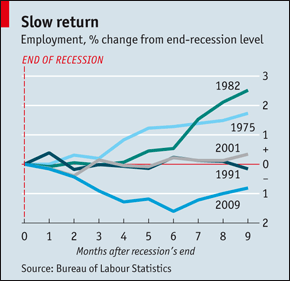With the economy in an inevitable tailspin toward the first recession in over a decade, there remains ample click bait apocalyptic article titles touting the economy’s inevitable downfall. The most alarming recent data is the millions that filed for unemployment in a single week–the largest such black swan event in the history of the country. Further still are the discussions that we may eventually be stuck–similar to the Great Recession of 2008–in a recovery that excludes jobs as we emerge from this cluster.
Touting numbers from the last recession, some have opined we are headed into similar waters this time. Alarming indeed.
If there is a silver lining to all of this, it is that such events are often breeding grounds for innovation, pivots, startups and the birth of new companies. Truly, necessity is the mother of [fill in the blank] in situations like these. Such was the case during the Great Recession, when startups emerged to fill the employment vacuum.
But, as any founding entrepreneur will tell you, starting a business in a good economy is tough enough. Starting one on the heels of a major market dip can be more than difficult. Difficulties aside, many successful startups have emerged from the ashes of financial ruin. Sometimes the dip can be a catalyst for the next big thing.
Benefits of Founding a Company During a Recession
With millions of displaced workers struggling without a paycheck and unemployment benefits drying up, entrepreneurs often emerge to complete tasks as contractors during periods of economic uncertainty. It is true that larger firms tend to lay-off and/or furlough full-time W2 employees during times of uncertainty, but they also need work done. Large layoffs are typically used as a preservation mechanism for large companies wanting to shield themselves from ultimate demise, but that does not mean the work has dried-up.
On the contrary. Massive layoffs often create a void in critical task completions internally that still need completed without the workers to engage. In such circumstances, many new or former employees have turned to 1099 contract relationships with new or former employers to complete such projects.
Such a relationship has a benefit to both the contract laborer and the employer. The employer can rely on the contractor to complete operational tasks that are still critical to the company’s survival, but do so without the hassle, chains and liability of a full-time W2 staff. It’s this very “gig” type model that made the likes of Upwork and Uber so successful. It also de-risked their operational expenses by moving employers to contractors, making the relationship much more flexible. Employers prefer such relationships as they can turn them on and off as-needed without the requirement of a long-term commitment to a salary.
Founders can often use this to their advantage by slipping back in to former organizations in which they were a part and charging more per hour for tasks they are already comfortable performing, while still looking for other similar gigs and opportunities elsewhere.
Recessions also fuel opportunity. Where there is pain, there are opportunities for a fix. New startups can quickly arrive to fix real or perceived issues in the economy. Recessions can often change shopping behaviors. In today’s environment, we’re not more dependent on Amazon than ever before, shifting us further away from brick-and-mortar reliance.
In today’s environment companies, including healthcare related entities, are profiting from medical supplies, remote patient monitoring and similar businesses that immediately service the current crisis. Such businesses will likely emerge as leaders that will help prepare for the “next big issue” due to their flash-in-the-pan revenues and quick notoriety.
In addition, frugal corporate and personal trends in the last recession, fueled the the founding of both Groupon and Uber. Groupon offered regular discounts to commodity-type products and services, driving foot traffic to local businesses while still saving consumers money. Similarly, Uber offered greater efficiency in transportation at a lower cost, while still benefiting its own bottom-line by avoiding a W2 workforce.
When it comes to founding a startup during a recession, finding and fixing a pain–including the immediate consumer and corporate pains of cost-savings–can be perhaps the biggest boon for successfully navigating the difficult waters of a recession-era entrepreneurship.
Downsides of Recession-Era Startups
Perhaps the biggest downside risk of founding a business during a downturn is the fact that the very budgets a founding entrepreneur may be seeking to tap, simply no longer exist. This lack of budget due to the tightening of the proverbial purse-strings is one of the very definitions of a recession. Both companies and families tend to reduce spending, hunker down and hold-out for larger budgets in the form of corporate spending or a consistent paycheck.
This is problematic for both self-funded startups looking to grow organically from client/customer revenue as well as those seeking private equity or venture capital support to scale a promising, novel concept. With tightened budgets on the corporate side, companies will be less likely to invest in products and services where they don’t see immediate value. And, if a founder is seeking investor financing, the probability of investor funding is significantly lower and investors become much more pitch-picky.
Furthermore, recession-bread startups also have a unique disadvantage to established firms when it comes to branding and marketing. Establishing a brand for organic inbound interest from either the internet or on-going referrals can take a lot of time. As a coworker is wont to say,
The best time to plant a tree was twenty years ago. The second best time is today.
In the world of digital and online marketing, the best time to start your website and perform SEO was two to three years ago. The second best time is certainly today, but that doesn’t mean there isn’t an uphill battle.
Unfortunately for startups with smaller budgets both paid and organic search marketing is less likely to move the needle, at least initially. On the organic online marketing side, startups should not expect to see SEO results (even when they are pushing hard) for at least 6 to 12 months, with major results not hitting until deep into year number two.
Worse still, pushing too hard can get startups in the equivalent of search engine hot water. Those performing enterprise SEO definitely have the advantage over startups. With established websites, large corporations can immediately push harder on SEO campaigns, thereby seeing more rapid results in shorter periods. Be aware that as a startup, unless you have an established website, you are less likely to receive a huge influx of organic interest at the outset unless you:
- Solve an immediate, real problem in the market
- Become a viral success
- Have a unique value proposition
- Partner with a large corporation for distribution and marketing
As someone who has established and run startups, the biggest problem with startups is not a lack of funding: it’s a lack of time. Startups tend to run out of runway. Speed to market and speed to revenue are critical for startup sustainability.
Again, establishing a brand-new company is extremely difficult even in the best economic environment. Doing so during a recession further dampens the likelihood of success. But, that doesn’t mean it’s not possible and that massive opportunities don’t exist. It just means greater savvy-ness and scrappy-ness may be required.











